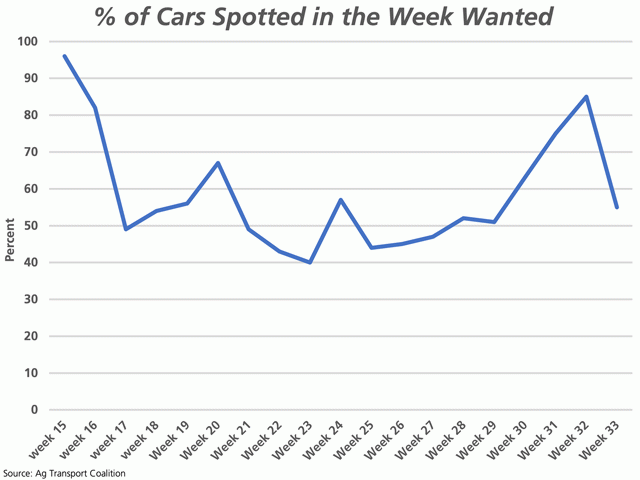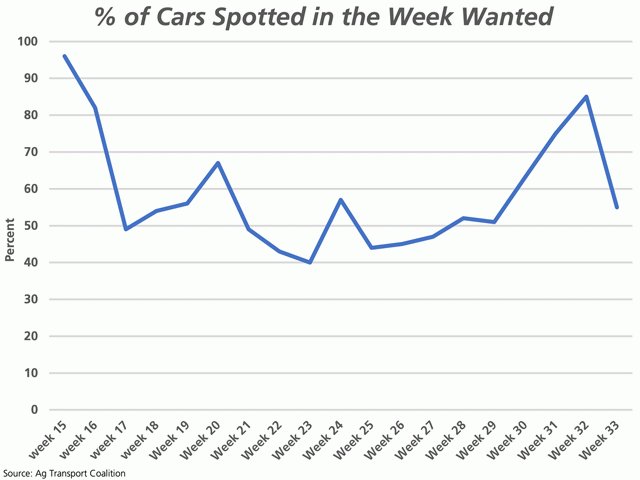Canada Markets
Canadian Rail Service Stoppage, Reliability Discussed by Panel
Some interesting points came out of this week's webinar on rail service and reliability, hosted by the Canadian Agri-Food Policy Institute, although there remains a wide range of opinions surrounding the severity of the issues and how they should be handled. While action is now needed, this is more easily said than done.
This comes on the heels of issues that have hit global supply chains hard throughout the pandemic, extreme flooding in British Columbia in November that led to track outages, cold winter weather, as well as the recent Canadian Pacific Rail work stoppage. Supply chains have been thrust further into the spotlight due to the war in Ukraine, as global trade patterns are being reevaluated.
President and CEO of Fertilizer Canada Karen Proud stated, "For every hour of disruption, we get delays for potentially days -- and two days of a strike, it may not sound very significant, but it can be weeks of delays." She went on to say that due to the stoppage, the industry was about two hours away from shutting down a potash mine, "significant not just for Canada, but for the rest of the world that depends on Canadian fertilizer."
A past event that resulted in an eight-day rail stoppage was reported to result in a $200 million to $300 million loss to the fertilizer industry, although she indicated that data covering the cost to shippers and customers due to service issues is not widely collected and documented.
Proud explained that 75% of Canadian fertilizer moves by rail to domestic markets, the United States as well as the West Coast for offshore movement. The system is fragile in a sense that extensive storage does not exist, with a steady rail movement required to facilitate production.
P[L1] D[0x0] M[300x250] OOP[F] ADUNIT[] T[]
Fertilizer Canada has called on the government to develop a long-term approach and regulatory environment, pointing to the potential for disruptions that "seems every year," adding that CN negotiations are coming up this year and add to potential risk ahead for 2022.
Wade Sobkowich, executive director of the Western Grain Elevator Association, explained how the Canadian grain industry assured global customers that the country has a smaller crop to move in 2021-22, but the industry would be able to move it in a timely fashion. Since this time, a number of issues have affected movement and the industry's reliability, indicating that "some we can control, some we can't." In advance of the most recent work stoppage by CP, the WGEA had taken a position that forced arbitration should be utilized as a means of settling the dispute. This is how both sides chose to address the matter in the second day of CP's lockout, leading WGEA and many outsiders to believe this should be viewed as a mandatory process from the start.
Malcolm Cairns, of Malcolm Cairns Research and Consulting, an ex-CP Rail and ex-government employee, focused on the long-term success of the railroads. This includes overall productivity gains of roughly 2% annually, with increased use of new high-capacity cars, more efficient locomotives, increased line capacity, increased use of technology and improved operations.
Cairns downplayed the labor issues, stating they are infrequent and the government is quick to step in. The views of the railway are clearly at odds with the views of shippers, while he overlooked the costs pushed on to shippers/customers resulting in even a brief outage, not to mention the damage to Canada's reputation as a reliable supplier.
Scott Streiner, mediator and arbitrator with ADR Chambers, discussed the complexities of using data to better understand the industry. Order fulfillment, as seen on the attached graphic, can be distorted as shippers are said to over-order cars. He believes the challenge cannot be addressed with the current available data, while firms such as the railways are reluctant to share data outside of the organization for competitive reasons.
The idea of declaring grain movement an essential service drew mixed reviews from the four panelists. The two shippers on the panel (grain and fertilizer) were in support. Cairns said he felt this move would harm labor relations between the railroads and their unions, while this form of government intervention would be "a lot of effort for very little gain."
Streiner said he thought the odds of the government taking this approach would be "very, very low." First, he indicated that it would require a total overhaul of Canada's Labour Code, as there is currently no federal provision that allows for a sector to be declared essential. Those that do exist are based on provincial legislations. In addition, he stated the Supreme Court of Canada has protected the right to strike in decisions from 2007-15, while striking down challenges from the provinces during this period. This right is a viewed as a "constitutionally protected right."
One discussion that could be the focus of a future challenge is Clause 87.7 of the Canada Labour Code that prevents dock workers from striking while loading vessels of grain; the obligation to load vessels remains in the event of a strike. As indicated by Sobkowich, "That does us no good if we can't get the grain there."
Other ideas for major change from the WGEA included increasing the competitive environment the railroads operate in by expanding the inter-switching limits currently in place, while forcing railroads to adhere to their grain shipping plans.
As indicated by Proud, food security has become a more widely recognized issue for Canadians, first with the pandemic shortages and more recently with the war in the Black Sea region. Canada's role in feeding the world and providing nutrients necessary for crop production may possibly move government to act over time.
Cliff Jamieson can be reached at cliff.jamieson@dtn.com
Follow him on Twitter @Cliff Jamieson
(c) Copyright 2022 DTN, LLC. All rights reserved.






Comments
To comment, please Log In or Join our Community .